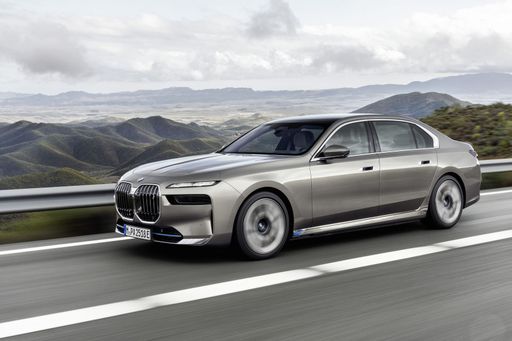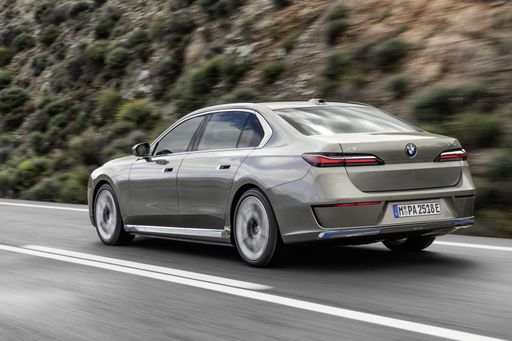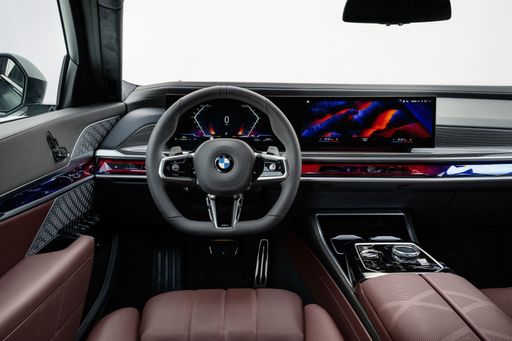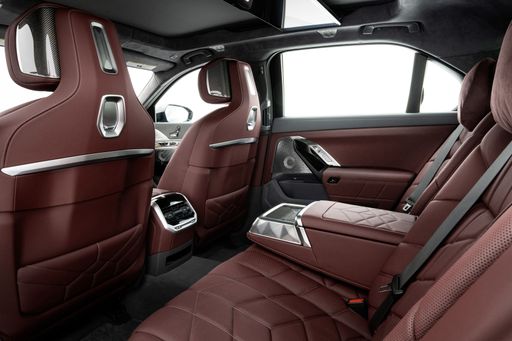BMW i7 vs Hyundai IONIQ 9 – Differences & prices compared
Compare performance, boot space, consumption and price in one view.
Find out now: which car is the better choice for you – BMW i7 or Hyundai IONIQ 9?
The BMW i7 (Sedan) comes with a Electric engine and Automatic transmission. In comparison, the Hyundai IONIQ 9 (SUV) features a Electric engine with Automatic transmission.
When it comes to boot capacity, the BMW i7 offers 500 L, while the Hyundai IONIQ 9 provides 338 L – depending on how much space you need. If you’re looking for more power, decide whether the 659 HP of the BMW i7 or the 428 HP of the Hyundai IONIQ 9 suits your needs better.
In terms of consumption, the values are 18.50 kWh per 100 km for the BMW i7, and 19.90 kWh for the Hyundai IONIQ 9.
Price-wise, the BMW i7 starts at 99200 £, while the Hyundai IONIQ 9 is available from 58700 £. Compare all the details and find out which model fits your lifestyle best!
BMW i7
The new BMW i7 epitomises luxury and innovation, seamlessly blending advanced technology with elegant design. Its interior offers an unparalleled experience, with premium materials and cutting-edge features that create a tranquil yet engaging atmosphere for both driver and passengers. The i7's performance is both dynamic and efficient, demonstrating BMW's commitment to sustainable driving without compromising on the exhilarating drive the brand is known for.
details @ press.bmwgroup.com
@ press.bmwgroup.com
 @ press.bmwgroup.com
@ press.bmwgroup.com
 @ press.bmwgroup.com
@ press.bmwgroup.com
 @ press.bmwgroup.com
@ press.bmwgroup.com
Hyundai IONIQ 9
The Hyundai IONIQ 9 is a bold step forward in the automotive world, combining cutting-edge electric technology with a sleek and modern design. This model stands out with its spacious interior and advanced features, ensuring both comfort and convenience for drivers and passengers alike. As Hyundai pushes the envelope in eco-friendly innovation, the IONIQ 9 represents the future of sustainable driving with its impressive range and performance capabilities.
details

|
|
|
|
|
Costs and Consumption |
|
|---|---|
|
Price
99200 - 157000 £
|
Price
58700 - 74400 £
|
|
Consumption L/100km
-
|
Consumption L/100km
-
|
|
Consumption kWh/100km
18.5 - 20.8 kWh
|
Consumption kWh/100km
19.9 - 20.6 kWh
|
|
Electric Range
559 - 624 km
|
Electric Range
600 - 620 km
|
|
Battery Capacity
101.70 kWh
|
Battery Capacity
110 kWh
|
|
co2
0 g/km
|
co2
0 g/km
|
|
Fuel tank capacity
-
|
Fuel tank capacity
-
|
Dimensions and Body |
|
|---|---|
|
Body Type
Sedan
|
Body Type
SUV
|
|
Seats
5
|
Seats
7
|
|
Doors
4
|
Doors
5
|
|
Curb weight
2595 - 2770 kg
|
Curb weight
2594 - 2689 kg
|
|
Trunk capacity
500 L
|
Trunk capacity
338 L
|
|
Length
5391 mm
|
Length
5060 mm
|
|
Width
1950 mm
|
Width
1980 mm
|
|
Height
1544 mm
|
Height
1790 mm
|
|
Payload
480 - 535 kg
|
Payload
586 - 643 kg
|
Engine and Performance |
|
|---|---|
|
Engine Type
Electric
|
Engine Type
Electric
|
|
Transmission
Automatic
|
Transmission
Automatic
|
|
Transmission Detail
Reduction Gearbox
|
Transmission Detail
Reduction Gearbox
|
|
Drive Type
Rear-Wheel Drive, All-Wheel Drive
|
Drive Type
Rear-Wheel Drive, All-Wheel Drive
|
|
Power HP
455 - 659 HP
|
Power HP
218 - 428 HP
|
|
Acceleration 0-100km/h
3.7 - 5.5 s
|
Acceleration 0-100km/h
5.2 - 9.4 s
|
|
Max Speed
205 - 250 km/h
|
Max Speed
190 - 200 km/h
|
|
Torque
650 - 1100 Nm
|
Torque
350 - 700 Nm
|
|
Number of Cylinders
-
|
Number of Cylinders
-
|
|
Power kW
335 - 485 kW
|
Power kW
160 - 315 kW
|
|
Engine capacity
-
|
Engine capacity
-
|
General |
|
|---|---|
|
Model Year
2022 - 2023
|
Model Year
2025
|
|
CO2 Efficiency Class
A
|
CO2 Efficiency Class
A
|
|
Brand
BMW
|
Brand
Hyundai
|
BMW i7
The Pinnacle of Electric Luxury: BMW i7
Introducing the BMW i7, the latest in electric innovation from one of the world's premier automobile manufacturers. Blending cutting-edge technology with luxurious comfort, the i7 represents a significant leap forward in the electric vehicle (EV) market. This article delves into the technical specifications and innovative features that set the BMW i7 apart from its competitors.
Powerful Electric Performance
Under the sleek exterior of the BMW i7 lies a powerhouse of electric capabilities. Depending on the model configuration, the i7 offers between 455 and 660 PS, with a torque of up to 1100 Nm. This ensures an exhilarating driving experience, whether you choose the rear-wheel drive or all-wheel drive configuration. The acceleration is equally impressive, with the i7 capable of going from 0 to 100 km/h in just 3.7 to 5.5 seconds.
Efficient Energy Consumption
The efficiency of the BMW i7 is noteworthy, with an energy consumption ranging from 18.5 to 20.8 kWh/100 km. This efficiency, combined with a substantial battery capacity of 101.7 kWh, gives the i7 an electric range of between 559 and 623 kilometres. BMW’s commitment to sustainability is further underscored by its zero CO2 emissions, reinforcing its status as a premium yet environmentally conscious choice.
Sophisticated Interior and Technology
Inside, the BMW i7 is the epitome of luxury. With seating for five, the interior exudes elegance and comfort. Advanced technology is at your fingertips with features such as the latest iDrive system, providing seamless connectivity and enhanced control over vehicle functions. The i7 ensures you travel in style with its sophisticated Design Pure Excellence, M Sport package, and M Sport package Pro interior trims.
Dimensions and Capacity
The i7’s ample dimensions – with a length of 5391 mm, width of 1950 mm, and height of 1544 mm – are matched by its generous luggage capacity of 500 litres, ensuring practicality alongside luxury. The car's robust build is complemented by a payload capacity of between 480 to 535 kg, ensuring the i7 is as functional as it is stylish.
Cost and Efficiency
With prices ranging from €115,700 to €181,800, the i7 is positioned as a high-end vehicle offering value through its advanced features and performance. The monthly operating costs range between €2,143 and €3,027, while the cost per kilometre is approximately 85.7 to 121.1 cents. Despite its upscale market positioning, the i7 offers competitive efficiency with its remarkable CO2 emission-free driving and energy-saving technologies.
Conclusion
The BMW i7 stands as a testament to the brand’s innovation and dedication to sustainable luxury. By marrying performance, efficiency, and cutting-edge technology, BMW has ensured that the i7 not only meets but exceeds the expectations of discerning EV enthusiasts. The i7 is not merely a car; it is a statement of intent in the future of sustainable luxury. Experience the future today with the BMW i7.
Hyundai IONIQ 9
The All-New Hyundai IONIQ 9: Redefining Electric Mobility
As the automotive world advances towards a sustainable future, the 2025 Hyundai IONIQ 9 emerges as a powerful testament to the fusion of luxury, innovation, and eco-conscious engineering. Designed as a premium electric SUV, the IONIQ 9 offers a blend of advanced electric performance and cutting-edge technology.
Unmatched Performance and Efficiency
The Hyundai IONIQ 9 arrives in multiple variants, catering to diverse driving preferences with its array of power outputs and configurations. At the core, you'll find either a rear-wheel-drive model or an all-wheel-drive setup. The power output ranges from a robust 218 HP for daily efficiency to an exhilarating 428 HP in the high-performance version.
The efficiency of the IONIQ 9 is equally remarkable, boasting an electric consumption between 19.9 and 20.6 kWh per 100 km. This ensures a substantial range of 600 to 620 km on a single charge, powered by a 110 kWh battery capacity. With a top speed ranging between 190 and 200 km/h and a dynamic acceleration capability that propels the SUV from 0-100 km/h in just 5.2 to 9.4 seconds, the IONIQ 9 is engineered for thrill and precision.
Innovative Technological Features
The Hyundai IONIQ 9 is not just about remarkable performance; it is a technological marvel designed for a sophisticated driving experience. Equipped with an automatic transmission system and a reduction gearbox, the IONIQ 9 enhances driver engagement while maintaining seamless power delivery. The zero-emission SUV carries a CO2 efficiency class of A, symbolizing its commitment to eco-friendly transportation.
Advanced safety and infotainment systems underscore the IONIQ 9’s tech-forward nature. Whether navigating busy city streets or exploring open highways, Hyundai's cutting-edge driver-assistance technologies are ever-present, making each journey secure and enjoyable.
Luxurious Design and Comfort
With dimensions measuring 5060 mm in length, 1980 mm in width, and 1790 mm in height, the IONIQ 9's substantial presence on the road is undeniable. Its 7-seater arrangement accommodates families and group travelers with ease, supported by intelligently designed interiors that prioritize comfort and functionality.
The trunk capacity of 338 liters ensures ample space for luggage, making the IONIQ 9 an ideal companion for those long family trips. Coupled with a payload capacity of up to 643 kg, versatility is at the heart of its design ethos.
A Commitment to Sustainability
The Hyundai IONIQ 9 exemplifies Hyundai's steadfast dedication to a sustainable future. With a curb weight ranging from 2594 to 2689 kg, it is engineered to optimize energy usage while delivering dynamic performance. The zero grams CO2 emission underlines its role as an eco-friendly powerhouse in the electric SUV segment.
As Hyundai continues to innovate and push boundaries, the IONIQ 9 sets a new standard for electric luxury vehicles, offering environmentally conscious drivers a chance to lead the charge in sustainable mobility without compromising on style, comfort, or performance.
Conclusion
The Hyundai IONIQ 9 stands as a beacon of the next generation of electric vehicles. Luxury meets responsibility in this masterfully engineered SUV. With its assortment of technical advancements and a firm commitment to reducing the carbon footprint, the IONIQ 9 not only paves the way for future cars but also transforms how we perceive environmentally responsible driving. As we stride into an era of greener motoring, the IONIQ 9 leads with elegance and purpose, truly a testament to Hyundai's innovation legacy.
Which drive types are available for the BMW i7?
Available as Rear-Wheel Drive or All-Wheel Drive.
The prices and data displayed are estimates based on German list prices and may vary by country. This information is not legally binding.
